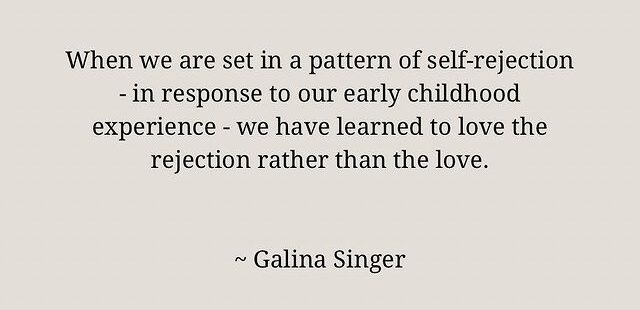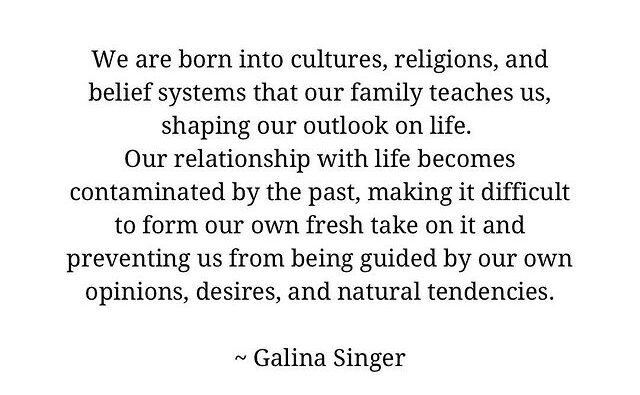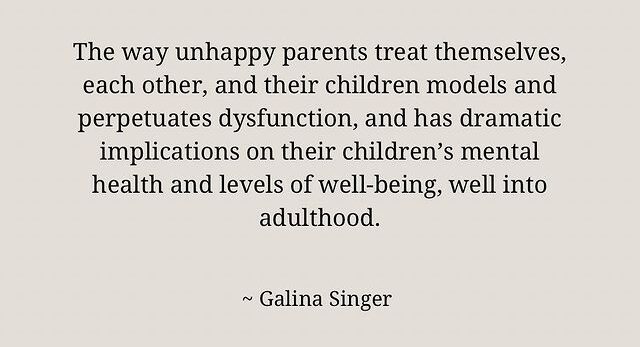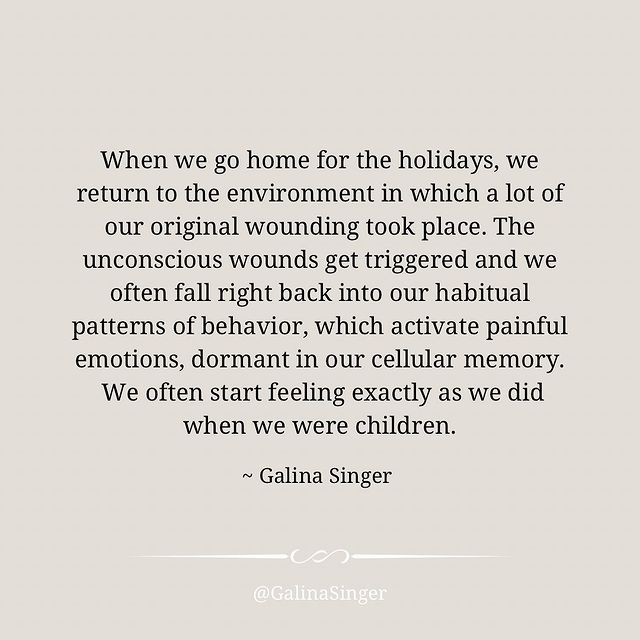Without self-compassion, there can be no healing
Our craving to be loved is often confused with our capacity to love.
The greater is our need to be loved, the more it reveals that we are still fearful, anxious, and dependent on others.
Viewing others as love deliverers dehumanizes them. We are not really taking them in or seeing them for a sovereign being that they are, but rather as the deliverer of that elusive love to fill a void within, thus limiting and causing a fractured impression, disconnected from their full essence.
If these people do not fulfil our need for love we tend to treat them as wrong and generally put them down.
Seeking love from outside puts us in a state of anxiety, bondage, and dependency, in which we become unable to love and to open up to others.
Unblocking our own channel to love sets us free and helps us to fulfil our personal needs directly.

It’s easier to write these types of posts for me from the perspective of being a child of my parents, harder when I remember that I am also the parent to my children.
The statement remains true.
Motherhood is attached to an image of happiness, unconditional love, clean happy smiley children and a perfect family.
In my experience motherhood brought me in contact with my darkness.
All that I suppressed as a child trying to survive in my own family of origin came rushing in when I became a mother.
I was not equipped to deal with complicated yet perfectly normal feelings like anger and fear. Big feelings, big reactions. I observed those play out in my own parents as violent and frightening outbursts, which caused me to self-reject.
I now deal with the fact of causing this in my own children, passing on the inherited family dysfunction like a treasured tradition.
That is why I question tradition.
That is why I want to disrupt what we call family values.
That is why I dare talk about motherhood in less than idyllic terms.
Because behind all the smiley family pictures lurk secrets, the unspeakable, abuse.
Because all of our attachment wounds are caused in our families of origin and are dragged into every relationship we form in our lives.
Hurt people hurt people.
Healed people heal people.
I am interested in the path of transformation from hurt toward healed.
It requires raw honesty and courage.
And incredible amounts of self-forgiveness and self-compassion.
Without self-compassion, there can be no healing – because without it we cannot accept our darkness.
I am learning to be Safe to Be Me.
All of me.
So I can change what I now know as unacceptable.

No matter how different our own lives are from those of our parents, we carry the emotional and energetic residue of their issues.
We inherit their fears, frustrations, and inadequacies, their ambitions and dreams, as we learn to perceive our own life from a kind of distorted lens.
For example, when our parents did not get the attachment they needed from their primary caregivers in childhood—having lost their own parents to war or illness, having experienced neglect or abandonment—they are unable to pass secure attachment down to their children, causing a cascade of attachment dysfunction.
We do not know how to give what we did not get. This is why depression and anxiety run in families, especially families that have a hard time with secure attachment.

I used to believe that because my parents stayed together that it provided all the stability that I needed as a child.
I was raised to believe that my parents stayed together “for us,” their children. It was believed as the ultimate and worthy sacrifice.
As a result, I have learned that lying, cheating, denying what I’ve witnessed, avoiding difficult conversations, and keeping secrets was a “normal” part of family life.
Today I know that the way unhappy parents treat themselves, each other, and their children models and perpetuates dysfunction, and has dramatic implications on their children’s mental health and levels of well-being, well into adulthood.
There is a specific mechanism with which every child copes with their environment. We internalize our caregivers’ angry or critical voices as a way to self-police, to remain within the lines of what is permitted. This is how we try to control the environment in which we otherwise feel helpless. We do this in order to prevent conflict with people on whom we depend for survival and to minimize further humiliation.
By the time we leave our parents’ house, we have internalized all the dysfunctional patterns. And now we have a vigilant inner voice that does all the punishing and criticizing.
I used to write all this from the perspective of a child of my parents, struggling with the choices my parents have made and their impact on my life.
What I’m starting to observe – with much pain and sorrow – is how my own inherited and adapted coping mechanisms have impacted and continue to impact my own children, as they take their first independent steps into adulthood.
Observing my children struggling in the prison of perfectionism and self-doubt is causing me unexpected amounts of pain. No words of wisdom I offer now can change their dynamic, which is now ingrained. They now have to find their own path to wholeness.

I noticed that my childhood wounds get triggered in particular circumstances – still.
My own father and most of my husband’s family don’t talk to me.
It is easy to fall into the trap of feeling responsible for other people’s confused feelings. Feelings that cannot be aired out or explained, discussed calmly and cleared out.
And while I believe all relationships are a co-creation of all parties involved, everyone has to want clarity for anything to change.
And many people do not – cannot – go there.
Every once in a while I want to prove to them that I am not the villain they believe me to be.
But I also know that the need to explain myself and turn them around to liking me comes from my own wounded place.
Maybe we never get over our wounds fully.
What does change is our ability to notice, understand the process of our emotional reactions, and have the tools to be able to nurse and soothe ourselves.
Our younger parts will always be there.
I used to want to heal them, fix them, so they no longer interfere with my need to “be better.”
Until I realized that I’m perpetuating the same violence to myself: trying to be someone other than all of who I am, to eradicate parts of me that interfere with my need to be likeable.
The path to Safety to be Me is allowing all of me. The truth of who I am: the parts easy to like and the parts that some find unlikeable.
In moments of deep emotional pain, these last few months what helped me a lot was me repeating to myself: ALL OF YOU IS WELCOME HERE.
There will always be someone who wishes I were more to their liking.
But my ability to accept myself in all of my complexity is the one relationship that matters most.
The ability to self regulate is a very important skill as well.
Having tools to recenter, to connect to the inner home, is an important skill to cultivate so we can show up to our relationships without dragging our emotional debris into them.
I even found myself creating small pockets of time on my own, so I can cry the pent up energy out, help move it out of my body. The release allows me to return to harmony.
This is Emotional Hygiene.
Processing our emotions is our own responsibility.
How have I changed since I had my six sessions with Galina?
I have changed in so many aspects that it is difficult for me to put them into words.
The most significant aspect is the change in my assertiveness and in expressing myself.
I used to be a spectator of my life: my energy turns inwards and sometimes can be taken as
a sign of passivity. Which for sure some times in the past happened. To be drowned was
easier than taking steps or my responsibilities. I would blame myself afterward, for not
having the courage to manifest my thoughts or opinions.
Now I take responsibility, I can express in a nonviolent way my meanings and most
importantly, I am an observer of myself and my process.
In the past I would just swim into my emotions, I would feel wrong for feeling in that or this
way, I would feel like I don’t belong and wouldn’t feel understood.
Through Galina’s coaching to reparent myself, of being my own authority, once I have a low
moment, it takes very little effort to recognize the pattern, to see where it comes from and my
response to it. I learned to not judge it and to feel without being lost in it.
In my relationships with others, I can be really present and manifest in my authenticity. I
don’t feel anymore like I need to play a part in order to be accepted: my conversations with
my friends have become deeper, a stronger connection has developed, I can feel and create
a safe space with them and manifesting as I am. In the past I was the listener, now I am
actively participating in the conversation. Some friendships have grown stronger and some
new connections have been created.
Once I discovered my true nature, it became impossible to stand in situations or
environments where my values are not met: in the past I would stay and swallow bad
feelings until my body would become ill. Now I can proudly set my boundaries and not see
them as being selfish.
I wish all of us could experience being our own most important authority, and I will gladly
recommend Galina for those who are ready to start the process and welcome magic in
life.
~Valentina